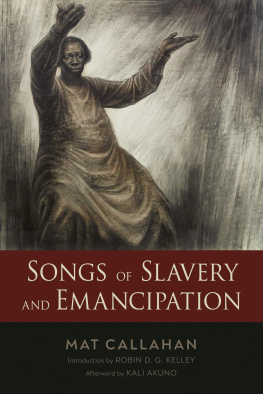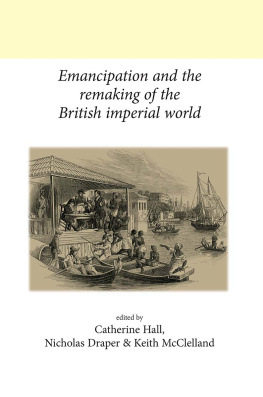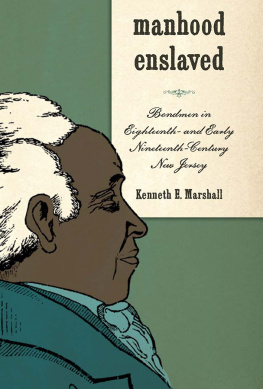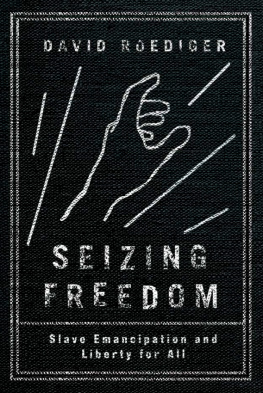Published with the assistance of the V. Ray Cardozier Fund
Published by Louisiana State University Press
Copyright 2013 by Louisiana State University Press
All rights reserved
Manufactured in the United States of America
FIRST PRINTING
DESIGNER: Mandy McDonald Scallan
TYPEFACE: Whitman
PRINTER AND BINDER: Maple Press, Inc.
Maps created by Mary Lee Eggart
Library of Congress Cataloging-in-Publication Data
Kerr-Ritchie, Jeffrey R.
Freedoms seekers : essays on comparative emancipation / Jeffrey R. Kerr-Ritchie.
p. cm. (Antislavery, abolition, and the Atlantic world)
Includes bibliographical references and index.
ISBN 978-0-8071-5471-7 (cloth : alk. paper) ISBN 978-0-8071-5472-4 (pdf) ISBN 978-0-8071-5473-1 (epub) ISBN 978-0-8071-5474-8 (mobi) 1. SlavesEmancipationAmericaHistory. 2. SlavesEmancipationUnited StatesHistory. 3. Antislavery movementsAmericaHistory. 4. Antislavery movementsUnited StatesHistory. I. Title.
HT1050.K47 2013
306.362097dc23
2013028477
The paper in this book meets the guidelines for permanence and durability of the Committee on Production Guidelines for Book Longevity of the Council on Library Resources.

PREFACE
Comparison can be used both to stress the uniqueness of the historical process, which appeals to the dyed-in-the wool historicist, and to find common traits in the unique historical events and sequences. Comparison in history actually covers a middle ground between overemphasis of uniqueness and sociological generalization which by necessity remains within the realm of forms: it can synthesize the substance of history.
FRITZ REDLICH
We need to know much more about abolitionism, especially about the role and impact of diaspora Africans, not only in the United States and Brazil but for all former slave areas.
JOSEPH E. HARRIS
The notable absence of any truly workable, comprehensive account of emancipation in formal comparative terms is perhaps indicative of the difficulties in this instance. It may well be that studies of the diaspora that was slavery have been enabled by the fact that despite its institutional diversity there is a recognizable, coherent set of parameters that give it shape.
THOMAS C. HOLT
Free your mind, and the rest will follow.
EN VOGUE
This book compares, contrasts, and connects the quest for emancipation by slaves, self-liberators, slave soldiers, black abolitionists, freedwomen, freed children, and freedoms first generations throughout the nineteenth-century African Diaspora.
Its origins are simple enough. In the fall semester of 1990, I taught a freshmen seminar titled The Age of Emancipation at the University of Pennsylvania. The 1980s had ushered in some exciting emancipation studies by Robin Blackburn, Eric Foner, Thomas Holt, Ira Berlin, Steven Hahn, Gavin Wright, Rebecca Scott, Seymour Drescher, Peter Kolchin, George Frederickson, and Stanley Engerman, among others. Students seemed familiar with the rudiments of slavery (mostly in the United States) but were less clear on what happened after emancipation (especially in the United States). The class was well received. I became interested in comparative history. Over the next two decades, I taught courses on comparative slavery and comparative emancipation at both the undergraduate and graduate levels at several U.S. universities. Students usually received these classes with a great deal of enthusiasm. Some history department colleagues were less impressed. How could students comprehend several national and colonial histories when they did not even know their own nations history? Did not comparative work put method before empirical research? In which field did comparative studies fit?
I should mention that I had entered U.S. graduate school after escaping the stifling class and racial hierarchy of Margaret Thatchers Tory Britain during the mid-1980s. Imagine my surprise encountering Ronald Reagans United States, in which the civilized liberalism of Jimmy Carter was slowly being throttled by a ruthless ideological crusade against the poor and minorities domestically, as well as internationally against leftist regimes such as Maurice Bishops Grenada, Daniel Ortegas Nicaragua, and Mikhail Gorbachevs Soviet Union. Even more disturbing was entering a U.S. academic world after gaining the history doctorate and encountering a sort of programmed conformity about ways to argue and present oneself as a historian, educator, and colleague. I still recall the so-called advice of an esteemed colleague at a small liberal arts college in New England who informed me that it would serve me better if I learned to disagree less passionately in order to fit in with the rest of the department! The problem, of course, is that, although English is the lingua franca of Anglo-American academe, it is argued through in very different ways, as British academics in U.S. universities and U.S. academics in British universities know all too well.
Somewhere along these paths, I decided to write a book on emancipation from a comparative perspective. Part of the inspiration also drew from my discomfort with notions of the United States historical uniquenessan ideology that resonated profoundly with those of us in U.S. academe once fed a regular diet of peculiar British liberties throughout our official education. (Hang on, this exceptional U.S. argument sounds familiar!) Part of the intellectual interest further derived from research for my first book, on the political economy of the post-emancipation tobacco South, in which it became increasingly clear that politicians, planters, freedpeople, journalists, abolitionists, and others in the U.S. South were very much aware of previous emancipations elsewhere in the nineteenth-century Americas and often sought to compare theseeither favorably or criticallywith emancipation in the postbellum South. Building upon this contemporary awareness, my second monograph examined the commemorative and ideological links of West Indies Emancipation across the English-speaking Atlantic world between the 1830s and 1860s. This book, however, was very specialized, and remained trapped within the very framework it sought to escapenamely the Anglo-centric model of Black Atlantic studies. The next work, I decided, must be much more inclusive of emancipation outside of the Anglophone world. Unfortunately, the resulting hemisphere-wide topic called The Great Emancipators: How Slaves Destroyed Slavery in the Americas met with a tepid response from some quarters of the U.S. historical establishment. Moreover, although bits and pieces were presented at conferences and published as articles, others were rejected after ridiculously long review processes. This negative outcome might have been due to the uninspiring nature of the topic, although I doubt it. It might have been because the role of slaves in ending slavery is now old hat to scholars and others (oh, how I wish this was so!). One anonymous reviewer of an abbreviated essay version of the project eventually rejected by







 BATON ROUGE
BATON ROUGE